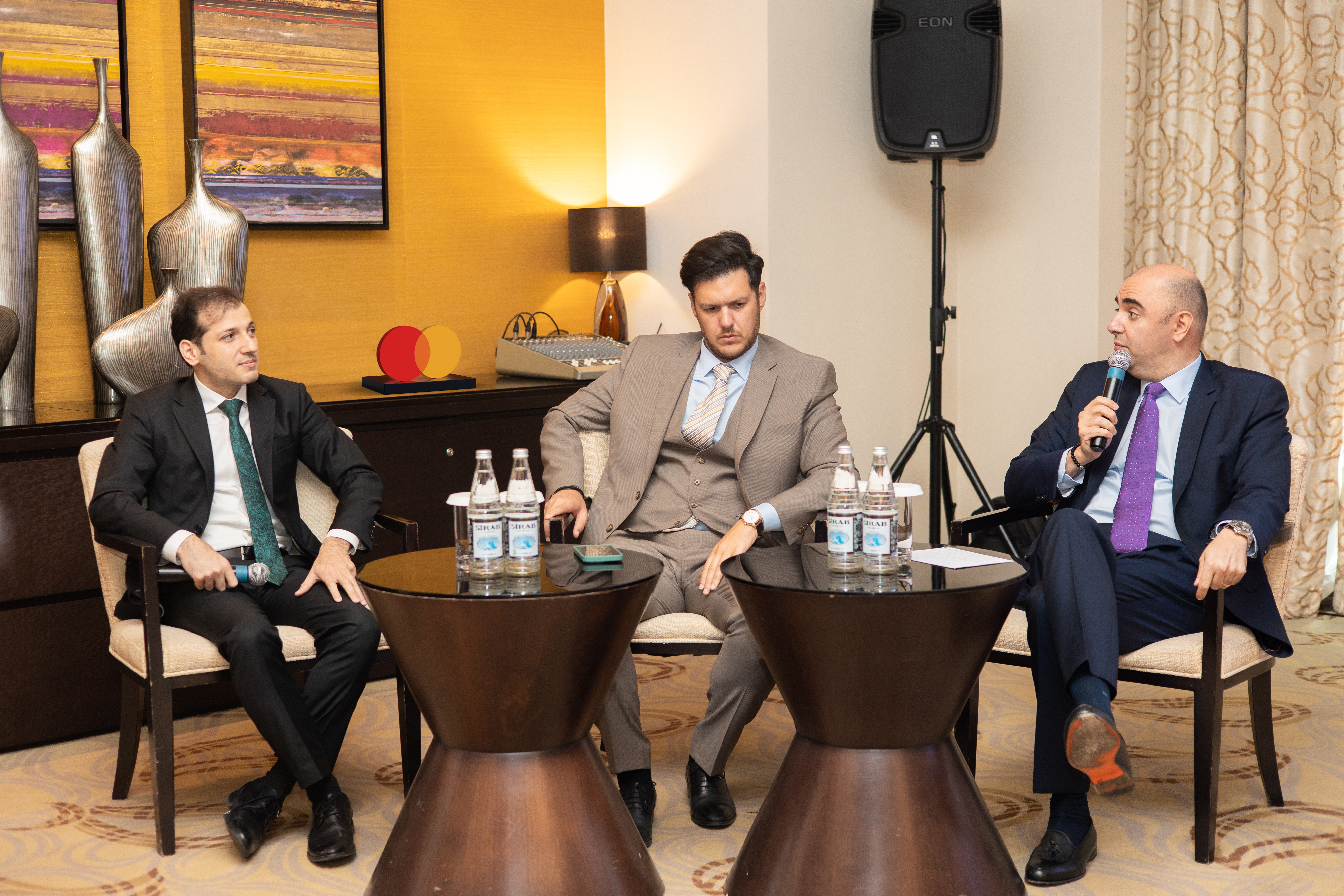Shaping the Future of Finance: Mastercard and AmCham Explore the Role of AI in Financial Services

- AI is reshaping finance, from customer interaction to fraud detection, urging a shift from traditional interfaces to intelligent, conversational platforms.
- Azerbaijan’s rapid digital transformation, noting the country’s strong adaptability and readiness to adopt next-gen financial technologies.
- AI should solve real business challenges, with a focus on meaningful use cases, not hype-driven adoption.
Baku, Azerbaijan – July 11, 2025 — Artificial intelligence isn’t just a buzzword anymore — it’s actively changing how we bank, shop, and pay. That was the main message at the AmCham event on 8th July in Baku titled “Adapt or Lag: AI’s Inevitable Role in Finance,” where Mastercard leads the way to explore what’s next for the industry.
The keynote presentation was delivered by Mr. Mehmet Gülez, Services Business Lead at Mastercard, Turkey & Azerbaijan Cluster. In his address, Mr. Gülez shared insights on how AI is transforming customer experiences, streamlining operations, and enabling smarter, data-driven decision-making across the finance sector.
The second part of the event featured a dynamic panel discussion by Mr. Mehmet Gülez – Services Business Lead at Mastercard, Turkey & Azerbaijan Cluster and Mr. Mehmet Ali Savaş – Director of Digital Banking at ABB Bank. The panel was moderated by Mr. Hamid Salamli, Business Development Director at Mastercard Services.
AI Agents Are Taking the Lead
One of the central ideas discussed during the panel was the growing role of smart AI “agents” in everyday commerce. In the near future, these agents won’t just process payments — they’ll manage the entire purchasing journey: from searching for products and comparing prices to completing transactions and handling post-purchase support.
This shift represents a move away from apps and websites toward intelligent assistants that understand user preferences, remember previous choices, and act proactively on behalf of the customer — making shopping faster, easier, and more personalized than ever before.
“We’re heading into a phase where the interaction layer becomes smarter than the interface,” noted Mehmet Gülez. “AI agents won’t just execute — they’ll understand, anticipate, and act for the user.”
This is more than just a convenience play. It’s a shift in how the entire payment system is built — and it means financial institutions need to rethink how they connect, communicate, and offer services in this new AI-powered world.
Smarter Payments, Safer Systems
The speakers also pointed out that while AI is already transforming areas like marketing and customer service, payments are the next big frontier — and they come with extra layers of complexity: trust, regulation, and security.
Mastercard’s use of Recorded Future reflects its commitment to leading in AI-powered cybersecurity. The platform applies advanced machine learning to real-time and historical threat data, enabling Mastercard to identify risks earlier and respond more effectively. By integrating this intelligence into its fraud and risk systems, Mastercard is strengthening its ability to prevent attacks before they happen — demonstrating how AI can enhance security, speed, and decision-making at scale.
What This Means for Azerbaijan
Azerbaijan isn’t just watching these changes — it’s part of them. As Mehmet Gülez shared, the country has made fast progress in digital finance over the past few years. He’s seen transformation here happen not just year over year, but month to month.
“The speed of digital development in Azerbaijan is genuinely impressive,” Gülez said. “What’s happening here in months takes years elsewhere. That agility is a major advantage.”
Compared to other markets in the region, Azerbaijan stands out for its openness to innovation. Local banks and businesses are more flexible and quicker to adopt new technologies, which puts the country in a strong position to benefit from the next wave of AI-led financial services. For example, Azerbaijani financial institutions have already begun experimenting with AI-powered customer support, automating responses to common queries, and piloting digital onboarding journeys with integrated risk scoring — solutions that were considered cutting-edge just a few years ago.
Of course, there are still gaps — especially in things like e-commerce infrastructure, data systems, and digital logistics. But the mindset is already there. According to Mastercard, Azerbaijani banks are almost ready to plug into global digital ecosystems — the next big step on this journey.
Not One-Size-Fits-All
Smaller banks and fintechs don’t need to compete with the biggest players on every front. Instead, they should find the areas where they know their customers best — and use AI to amplify that advantage. Whether it’s in personalized risk analysis or niche services, AI can help scale what smaller players already do well.
In the end, the panel wasn’t just about technology — it was about people. How we live, work, and pay is changing fast. Mastercard’s message was simple: adapt wisely, focus on real impact, and build systems that make people’s lives easier — not just more digital.
About Mastercard
Mastercard powers economies and empowers people in 200+ countries and territories worldwide. Together with our customers, we’re building a sustainable economy where everyone can prosper. We support a wide range of digital payments choices, making transactions secure, simple, smart and accessible. Our technology and innovation, partnerships and networks combine to deliver a unique set of products and services that help people, businesses and governments realize their greatest potential.